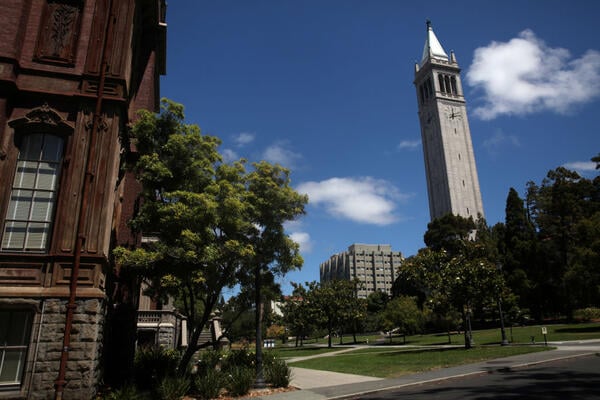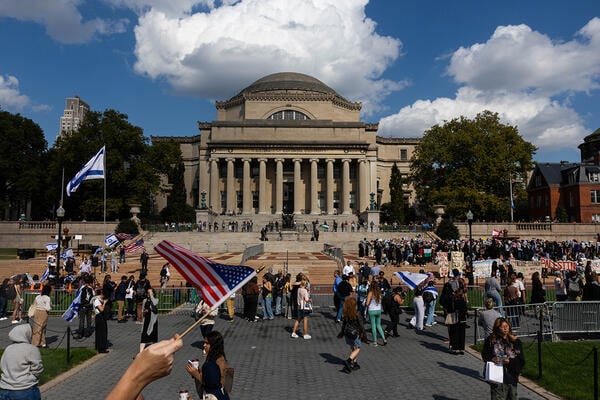When the Trump administration announced Friday it was cutting about $400 million in grants and contracts from Columbia University, it didn’t specify what exactly it was slashing. But news of the scope of the cuts has begun trickling out of the institution over the past couple of days.
So far, much of the information about the canceled grants has come via social media, as neither the Trump administration nor the university have provided a comprehensive accounting of what’s being cut. The National Institutes of Health did say earlier this week that it was pulling more than $250 million in grants from Columbia, though the agency wouldn’t share more details. And it’s hard to tell whether specific cuts are part of the $400 million or a continuation of the Trump administration’s general national reduction of federal funding to universities, such as axing grants it deems related to diversity, equity and inclusion.
On Tuesday, Joshua A. Gordon, chair of the university’s psychiatry department, emailed colleagues to tell them the National Institutes of Health had terminated nearly 30 percent of grants to Columbia’s medical school—including many within his own department.
“All of our training grants and many fellowships have been terminated,” Gordon wrote in the email, which a postdoctoral research fellow provided Inside Higher Ed.
Gordon wrote that he’s still working with university administrators “to find out the full extent of these terminations” and that “the institution is committed to identifying the resources that can be brought to bear to support the people and projects affected by the terminations.” He added, “We remain dedicated to ensuring that our trainees and early-career scientists have the support needed to continue their work and achieve their career goals.”
The Trump administration said this unprecedented $400 million cut was due to Columbia’s “continued inaction in the face of persistent harassment of Jewish students.” More cuts at Columbia and other universities could follow as Trump follows through on his pledge to crack down on alleged antisemitism and punish elite universities. Columbia has more than $5 billion in federal grants and contracts.
Columbia postdocs and faculty have taken to social media to announce canceled grants, fellowships and funding for Ph.D. students, showing some of the individual impacts on people and research wrought by the Trump administration’s actions. They include nixed training for researchers of depression and schizophrenia and a grant that would’ve provided free mental health resources to K-12 students.
Sam Seidman, a postdoc and a steward for the Columbia Postdoctoral Workers union, told Inside Higher Ed that, “as a Jew,” it’s “particularly outrageous” to hear the Trump administration justifying the cuts by saying it’s fighting antisemitism.
Seidman said he found out Monday that his T32 grant, an NIH training fellowship for new scientists, had been canceled. “I certainly don’t feel protected,” he said.
He said it’s clear the Trump administration doesn’t have an issue with antisemitism or even with Columbia specifically. Its issue, Seidman said, is with “public funding of science and it’s with public funding, period,” adding that “Columbia makes a convenient scapegoat.”
In an emailed statement, a Columbia Irving Medical Center spokesperson said, “Columbia is in the process of reviewing notices and cannot confirm how many grant cancellations have been received from federal agencies” since Friday.
The spokesperson said, “We remain dedicated to our mission to advance lifesaving research and pledge to work with the federal government to restore Columbia’s federal funding.”
In a separate statement Wednesday, interim president Katrina Armstrong, herself a medical doctor, didn’t mention the cuts and instead said she stands by broad principles such as “intellectual freedom” and “personal responsibility.”
“I have no doubt that the days and weeks ahead are going to be extremely difficult,” Armstrong said. “The best I can promise is that I will never stray from these principles and that I will work tirelessly to defend our remarkable, singular institution.”
Marcel Agüeros, secretary of Columbia’s chapter of the American Association of University Professors, said, “It’s already looking very grim.”
Agüeros said it’s a slow process to try to understand how the cuts are affecting such a large and decentralized university. But he said he has learned “it’s not just the kind of classic lab-based biomedical research that’s being impacted.”
Like Seidman, he said the cuts don’t seem to be about the grants themselves or Columbia. Instead, Agüeros said, it’s “an assault on universities in general” and the concept of peer review that the grants went through.
“It’s coming for you; it doesn’t really matter where you are or what you research,” Agüeros said
Cut Off at the Knees
In its Wednesday statement, the university medical center said that “from pioneering cancer treatments to innovative heart disease interventions and cutting-edge gene and cell therapies, research conducted by Columbia faculty has helped countless people live healthier, longer and more productive lives.”
Seidman said his NIH grant was for research on family and biological risk factors that predispose kids to develop eating disorders, depression and suicidal thoughts and behaviors. He thinks university higher-ups are trying to find alternative funding but “haven’t been any more specific than ‘we’re looking.’”
“It’s tragic, I mean these are lifesaving, potentially, interventions,” Seidman said. Yet the researchers developing them have been “cut off at the knees,” he said.
Gordon Petty, a postdoc in Columbia’s psychiatry department, said his T32 training grant, which has also been canceled, was to study schizophrenia. He said he heard that the department is still dedicated to supporting him, “but it’s unclear where that money’s coming from.”
Trump’s cuts appear to have also hit Teachers College of Columbia University, which is a separate higher education institution from Columbia with its own board. But it’s unclear if that’s part of the $400 million cut for allegedly not properly addressing antisemitism or part of nationwide cuts to grants perceived as being related to diversity, equity and inclusion. A Teachers College spokesperson said, “We are still sorting through the full impact on the college and will be in touch when we have more to say.”
Prerna Arora, an associate professor of psychology and education at Teachers College, said she got an email Friday from a deputy assistant U.S. education secretary announcing the cancellation of a five-year Education Department grant. Arora said most of the funds went directly to graduate students training to become K-12 school psychologists serving children in New York City.
The email, according to Arora, alleged that the grant funded “programs that promote or take part in initiatives that unlawfully discriminate on the basis of race, color, religion, sex, national origin or another protected characteristic” or that “violate either the letter or purpose of federal civil rights law” or “conflict with the department’s policy of prioritizing merit, fairness and excellence in education.”
“We already have students that are funded under this, and they are at the university and we are in the middle of our admissions cycle for next year,” Arora said. She said, “I’ve spoken to very scared and tearful students” who are afraid of what this means for their training and “for their future.”
And, beyond the impact on college students, Arora lamented the loss of the grant’s free help to K-12 students and families. “We could’ve helped many children who need this,” she said.
It’s unclear whether the Trump administration will restore the grants. Education Secretary Linda McMahon said after the announcement Friday that she had a “productive” meeting with Armstrong. Meanwhile, Columbia said in a statement that it’s “committed to working with the federal government to address their legitimate concerns.”
Agüeros, with the AAUP, said Columbia has already “gone overboard in an attempt to silence any kind of dissent.” Its previous president called in the New York Police Department to remove a pro-Palestinian protest encampment last spring and publicly criticized and revealed investigations into her own faculty in front of Congress.
“There’s this assumption that if we just go along with things we’ll escape somehow unscathed,” Agüeros said. But he noted the cuts still arrived.
“What did all of that get us—all of the sort of compliance that was put in place? It got us nothing.”




